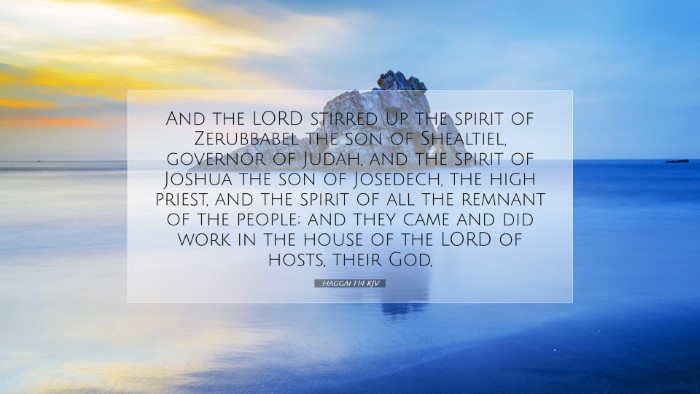Old Testament
Genesis Exodus Leviticus Numbers Deuteronomy Joshua Judges Ruth 1 Samuel 2 Samuel 1 Kings 2 Kings 1 Chronicles 2 Chronicles Ezra Nehemiah Esther Job Psalms Proverbs Ecclesiastes Song of Solomon Isaiah Jeremiah Lamentations Ezekiel Daniel Hosea Joel Amos Obadiah Jonah Micah Nahum Habakkuk Zephaniah Haggai Zechariah MalachiHaggai 1:14
Haggai 1:14 KJV
And the LORD stirred up the spirit of Zerubbabel the son of Shealtiel, governor of Judah, and the spirit of Joshua the son of Josedech, the high priest, and the spirit of all the remnant of the people; and they came and did work in the house of the LORD of hosts, their God,
Haggai 1:14 Bible Commentary
Commentary on Haggai 1:14
Haggai 1:14 states:
"And the Lord stirred up the spirit of Zerubbabel the son of Shealtiel, governor of Judah, and the spirit of Joshua the son of Josedech, the high priest, and the spirit of all the remnant of the people; and they came and did work in the house of the Lord of hosts, their God."
Introduction
This verse serves as a pivotal moment in the book of Haggai, illustrating the divine impetus behind the revival of God's people to rebuild the temple. The commentary here draws from the insights of various public domain scholars to offer a comprehensive understanding conducive to clergy and academicians.
Divine Initiative and Human Response
In Haggai 1:14, we see the critical theme of God's initiative in stirring the spirits of His people. The phrase "stirred up the spirit" suggests a divine action that goes beyond mere motivation. According to Matthew Henry, this stirring is a work of the Holy Spirit, implying that God actively engages with the hearts of His people to fulfill His purposes.
Albert Barnes elaborates that this stirring of spirit is indicative of divine influence, where God renews the commitment of His people to the covenant. This is significant as it sets the stage for their physical and spiritual restoration through the re-establishment of temple worship.
The Characters Involved
The verse mentions three key figures: Zerubbabel, Joshua, and the remnant of the people. Each individual plays a paramount role in the restoration process:
- Zerubbabel: As the governor, Zerubbabel symbolizes political leadership. His responsiveness to God's call reflects the importance of governance in spiritual matters. Adam Clarke points out that Zerubbabel's lineage (being of David's line) signifies the restoration of rightful leadership and the hope of a future Messiah.
- Joshua the High Priest: Joshua embodies spiritual leadership and represents the priestly function necessary for Israel's worship. His involvement emphasizes the interconnectedness of civil and ecclesiastical leadership, reflecting a holistic approach to national restoration.
- The Remnant: This term refers to those who returned from exile, symbolizing hope, faithfulness, and God's covenant promise. Matthew Henry notes that their action is not merely out of obligation but out of a newfound zeal that God provides.
The Spirit of Action
The collective stirring of spirits culminates in action. As highlighted in the commentary of Adam Clarke, true revival and restoration call for more than just inward stirring—they necessitate outward expression through tangible actions, exemplified by the rebuilding of the temple. The people's response is an act of obedience to God’s call, showcasing the vital relationship between belief and action.
The Significance of the Temple
The temple represents God's presence among His people. The building of the temple is more than an architectural project; it is the re-establishment of the covenant relationship. Albert Barnes notes that the physical structure serves as a reminder of spiritual truths, hosting divine worship and facilitating sacrificial practices that connect the people to God.
Application for Today
For contemporary pastors, students, and theologians, Haggai 1:14 provides numerous lines of reflection and application:
- God's Sovereignty: The commentary emphasizes God's sovereignty in mobilizing His people. The acknowledgment of this divine action can encourage believers to remain open to God’s leading in their lives.
- Importance of Leadership: The roles of Zerubbabel and Joshua highlight the significance of effective leadership—both spiritual and civil—in fostering a community aligned with God’s purposes.
- Community Involvement: The spirit of the remnant illustrates the power of collective action. Today’s believers are encouraged to work together for the common good, echoing the unity seen in the rebuilding efforts.
- Faith in Action: The reunion of spirit and action reminds Christians that genuine faith should lead to the tangible expression of worship and service.
Conclusion
Haggai 1:14 is a theologically rich verse underscoring the interplay between divine initiative and human response. The insights gathered from Matthew Henry, Albert Barnes, and Adam Clarke unite to affirm that when God stirs the spirit of His people, they are called to respond actively. Their labor is not merely for personal gain but is an act of obedience and honor to God, marking a significant undertaking with eternal implications in the life of the community of faith.


